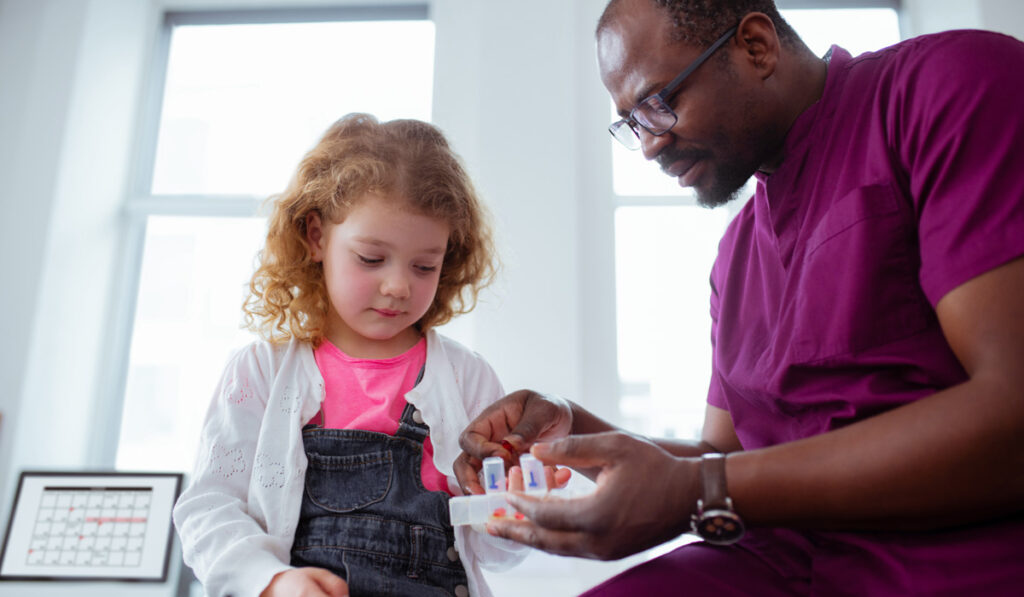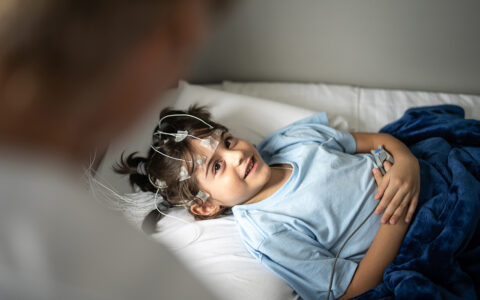In children taking a common SSRI, sertraline (Zoloft®), the relationship between the rate at which they metabolize the drug and their risk of side effects behaves oppositely to that relationship in adults, according to research by Katelyn Rossow, M.D., an instructor of pediatrics at Monroe Carell Jr. Children’s Hospital at Vanderbilt.
“In adults, slow metabolizers have more problems with side effects. In children, it turned out that both intermediate and slow metabolizers had less,” Rossow said.
“In adults, slow metabolizers have more problems with side effects. In children, it turned out that both intermediate and slow metabolizers had less.”
The findings point to the need to develop unique pediatric guidelines for antidepressant dosing, Rossow says. “It hasn’t been really clear what factors are involved in side effect risk.“
An Unexpected Finding
Rossow studied three SSRIs often used in pediatrics: sertraline, citalopram (Celexa), and escitalopram (Lexapro). They are all commonly metabolized by cytochrome P450 (CYP2C19). Few prior studies have addressed the relationship between SSRI adverse events and CYP2C19 metabolizer status in children, Rossow said, or in children with autism.
Rossow obtained a retrospective patient sample through Vanderbilt’s extensive BioVU database. Those included were under 18 years old at the time of the first antidepressant mention in the records and had at least two such mentions. Those taking sertraline did so for at least seven days. Those taking citalopram or escitalopram did so for at least two days.
“We were surprised to find that young children and adolescents who were either intermediate or poor metabolizers of sertraline were protected from adverse events.”
While there was no association between adverse events associated with citalopram or escitalopram and the rate at which CYP2C19 metabolizes the drugs, in the case of sertraline Rossow discovered a surprising relationship.
“We were surprised to find that young children and adolescents who were either intermediate or poor metabolizers of sertraline were protected from adverse events,” Rossow said. “We had expected children who were slow metabolizers to experience more side effects, like adults.”
Indication Matters
Rossow found that children with autism had an increased risk for side effects with sertraline compared to those taking the medication for another reason, such as anxiety and depression. This finding was not surprising as she noted children with autism often have more side effects while taking this medication.
“A lot of children with autism taking psychotropic drugs go through prolonged trial-and-error processes, with different drugs that don’t work well,” she said. There is relatively little information on the reason for this phenomenon, and Rossow would like to examine it in future studies.
Age an Independent Risk
While children on the autism spectrum are at especially high risk, the researchers emphasized that all children taking psychotropic drugs are at greater risk for adverse effects than adults. In Rossow’s study, the most common side effects were activation, worsened mood or irritability, agitation, somnolence and abdominal pain.
“These findings remind us that we don’t want to just extrapolate from children to adults. Children are not just small adults. That’s why we do these experiments.”
“These findings remind us that we don’t want to just extrapolate from children to adults,” said Sara Van Driest, M.D., an associate professor of pediatrics at Vanderbilt. “Children are not just small adults. That’s why we do these experiments.”







